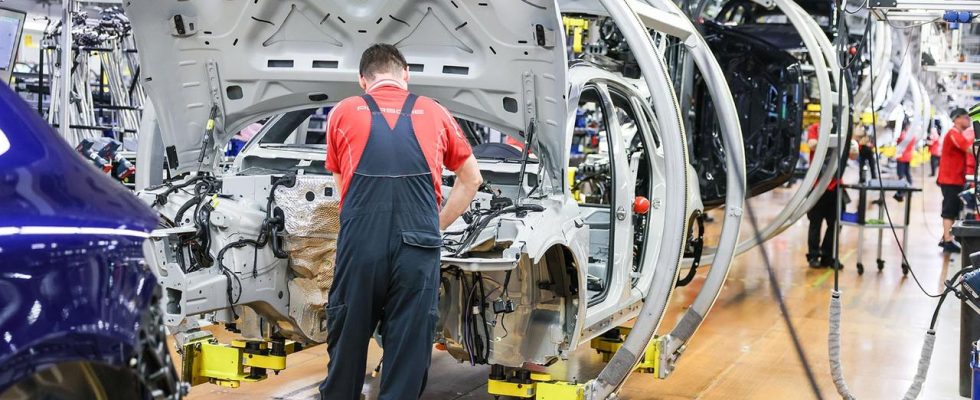Business representatives complain that there is less and less work being done in Germany. At the same time, the number of people in employment is higher than ever. This is an apparent contradiction that sparks debate.
The assessments couldn’t be more different. Federal Labor Minister Hubertus Heil (SPD) emphasizes: “Germany is a hard-working country” – and, like Chancellor Olaf Scholz, points out that more people are employed than ever before. According to current figures from the Federal Statistical Office for March, there are 45.7 million people.
With Employer President Rainer Dulger it sounds completely different: One should not be lulled into the illusion by the report of record employment that “that’s why everything is fine.” The high number of employed people is offset by a continuous decline in the average number of hours worked. Christian Sewing, CEO of Deutsche Bank and head of the banking association, concludes: “We have to work more again, certainly differently, but also harder.”
Contradictory Working time reports
The reports from economic researchers also seem irritating at first glance. The DIW in Berlin recently titled a study on the labor market with the following words: “In Germany, people are working more than ever before.” In contrast, the Institute for Labor Market and Occupational Research (IAB), the research institute of the Federal Employment Agency, reported: “Working hours have never been so low, except in the Corona year 2020.” Both reports were for the same year, 2023.
The contradiction is resolved when one considers what the respective numbers refer to. According to the IAB, the working hours per employed person were only 1,342 hours per year in 2023; This is the effective working time, taking into account overtime on the one hand and vacation and sick days on the other. This resulted in a decrease of 0.3 percent compared to the corresponding figure for the previous year and a decrease of 2.2 percent in the pre-Corona period. And the headline with the low working hours.
The total work volume in Germany, on the other hand, rose by 0.4 percent – as the IAB also reported in its annual balance sheet. This means: The effect of the higher number of employed people exceeded the effect of the lower individual working hours. The opposing developments – more people in employment, fewer hours per capita – are partly connected, as Professor Enzo Weber from the IAB explains.
More part-time work – also for men
For example, there is a tendency for more women to be active in working life. But since women still have higher part-time rates than men, the bottom line is that the average working hours per capita are falling, says Weber in an interview with ARD capital studio. The bottom line is that there would still be additional working hours, “because previously women weren’t even on the labor market.”
However, there is a second development that is increasingly influencing the number of working hours: men’s increasing interest in part-time work. Before Corona, this was hardly reflected in effective working hours, explains economist Weber. In the meantime, however, more and more men are realizing their desire for part-time work – also because of the desire to better distribute family and paid work within the partnership.
Overall, the part-time rate in 2023 across all employees was 39 percent. This already indicates that working time requirements are becoming more differentiated. The IAB researcher emphasizes that it is not about the much-discussed four-day week for everyone, but rather about more flexibility: about working weeks that can be adapted to personal situations and can also change over the course of life. It must be clear that shorter working hours have consequences for income: “Those who work more will earn more, those who work less will earn less.”
Professor Clemens Fuest, President of the Munich Ifo Institute, sees it very similarly. In principle, there is nothing wrong with people working less because of personal preferences and in return foregoing income and consumption. At the same time, Fuest points out a problem for the economy as a whole: When people work less and earn less, this also affects taxes and contributions. In particular on social insurance, which is financed by contributions from employees and employers.
Less work – more productivity?
IAB researcher Enzo Weber also takes the economic dimension into account: “An economy that works less will also achieve less added value.” At the same time, people who can choose their working hours according to their own preferences are particularly productive – which in turn benefits the economy.
The prerequisite for this is good political framework conditions. Representatives of business and the CDU/CSU and FDP are calling for financial incentives for people who want to work more. “Work, performance and hard work must be more worthwhile in our country,” says Stephan Stracke, chairman of the Labor and Social Affairs working group of the Union parliamentary group in the Bundestag. On the one hand, work incentives for those receiving social benefits should be improved. Only recently, a study commissioned by the Federal Ministry of Labor showed that in some cases higher earnings are completely offset by the loss of state support. Secondly, according to CSU politician Stracke, overtime should be given tax relief.
Shortage of skilled workers as Growth brake
Labor Minister Heil is not involved in overtime. He refers in conversation with the ARD capital studio on the fact that around half of the overtime is not paid at all: “Paying overtime properly – that is a contribution to fair performance.” In order to enable people to work more, the SPD politician Heil is primarily focusing on better conditions for child care. The main reason here is “involuntary part-time work, especially by women”.
No matter which concept is pursued, the question of working hours is likely to increasingly become a topic of political debate. The labor shortage is seen as a significant brake on growth and a structural problem in the German economy.
Hans-Joachim Vieweger, ARD Berlin, tagesschau, May 1st, 2024 7:54 a.m

